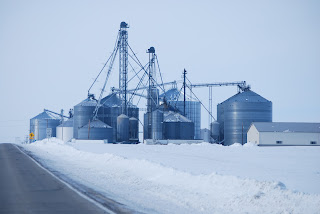I just finished reading a short article in Fast Company that discussed President Obama's push to make Wi-Fi more accessible to rural areas throughout the United States. I applaud this initiative and hope it gets the support it needs on The Hill.
In today's world of agriculture access is critical. Making the right decision is crucial to continued farm profitability. One sub-par choice like entering a field when it's to wet, planting to early, or applying fertilizer to late/early can heavily impact the bottom line in the downward direction. This is bad for the companies providing custom services to the farmer, bad for the farmer(s) who work tirelessly to supply us with food, feed, fuel, and fiber and can also be bad for the consumers if this leads to further consolidation in the marketplace led by decreased competition. Here are 5 reasons I think Wi-Fi everywhere is good for agriculture.
2.) Knowledge Sharing - With the rise of social media, more and more farmers are sharing information about their activities. This "real-time" sharing of information is helping other farmers throughout the growing season make better decisions and plan for future activities. For example, if you know a heavy rain is coming because Jim just posted a tweet, sent you a text message, or posted it on the social web, then you can plan accordingly and move your equipment where it needs to be.
3.) Agvocating - As we all know, the conversation about food has been elevated to a place where everyone is engaged. As such, there is a ton of misinformation out there. Having ubiquitous access to the web will allow farmers and ranchers to share their story not only from the office, but the field as well. Consumers want to know where their food comes from and who produces it. A direct connection to the farmer, even virtually, will enhance the trust between consumer and farmer and help build this much needed bridge
4.) Small Business Growth - We all know the the lifeblood of economies around the world is the small business. And the days of desktop applications are numbered. There are already a number of companies looking at their web-based strategy as well as a number of start-ups utilizing the web to deliver their service (shameless plug - My start-up is doing this). Increasing access to the web allows more companies to provide the level of service farmers and ranchers need to be successful in todays agricultural system as the market increases with increased access to the internet. The larger the market, the more opportunities available for entrepreneurs to form new companies and create more well paying jobs.
5.) Data Acquisition - It's all about the data folks. Data is what drives decisions, even the absence of data! At this point it is quite difficult to collect all the data we would like, at the resolution we need, to really make data-driven decisions. If we do collect the data, it is cumbersome and very time consuming, not to mention the possibility of errors. The more and more we increase access to the web to transmit data back to a smartphone where decisions can be made, the more profitable a farming operation can become. As OEM's work toward building sensors and telecommunications companies work toward access everywhere, we can work on how this real-time data can be used. Can anyone say agronomic, soil, and weather models? I sure can.
As I look toward the future, I see multiple data sets being integrated into a service to enable sound business decisions aided by stellar applications delivered over the mobile web.
What do you see? What benefits to agriculture do you see with increased access to the mobile web? Let us know in the comments.
Regards,
Nate J. Taylor
(814) 441-1867
natesuetaylor@gmail.com
Interested in more of my gibberish? You can follow me on Twitter @natejtaylor
Photo Credits
Flickr User Claudian-
Flickr User james_clear
Flickr User ShowGood














